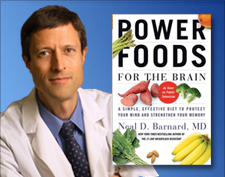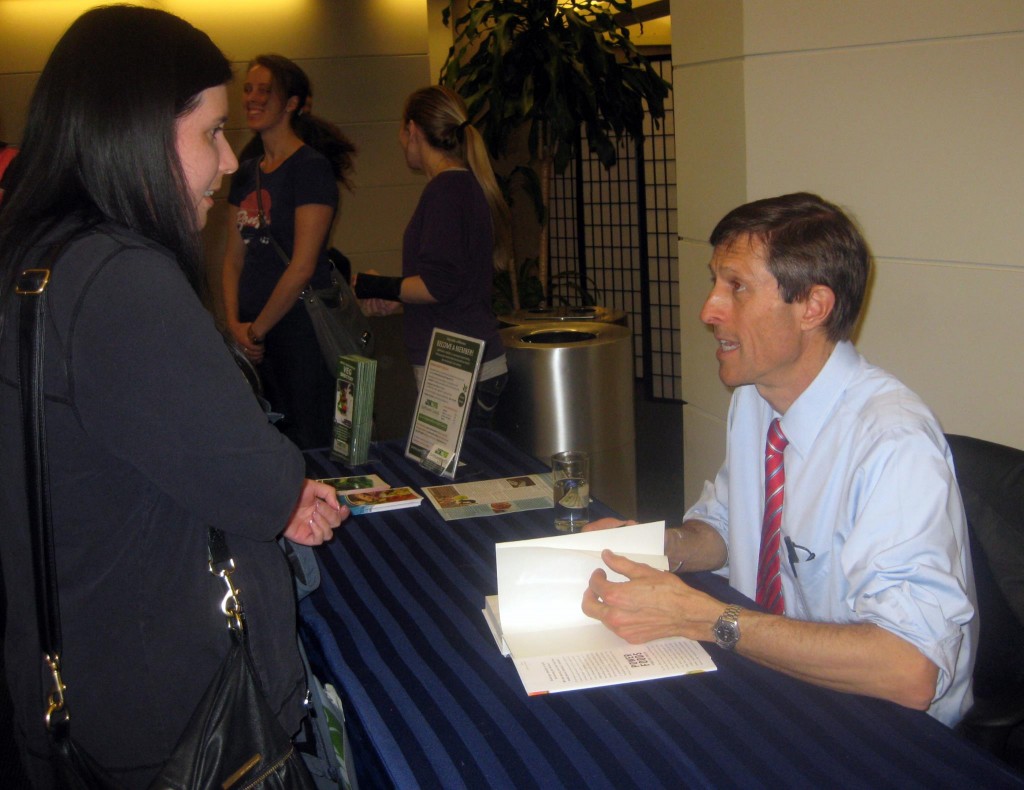 2 Fridays ago, my sister and I went to see Dr. Neal Barnard (founder and President of the Physicians’ Committee for Responsible Medicine) give a lecture in Vancouver, based on his latest book “Power Foods for the Brain“. I’ve seen him speak twice before in person (and several times on tv, now that he is becoming quite a popular personality in the mainstream media), and he never fails to impress me with his sound, expert knowledge on health and nutrition.
2 Fridays ago, my sister and I went to see Dr. Neal Barnard (founder and President of the Physicians’ Committee for Responsible Medicine) give a lecture in Vancouver, based on his latest book “Power Foods for the Brain“. I’ve seen him speak twice before in person (and several times on tv, now that he is becoming quite a popular personality in the mainstream media), and he never fails to impress me with his sound, expert knowledge on health and nutrition.
While standard medical school curriculum involves a miniscule amount of nutritional training, Dr. Barnard’s knowledge as a medical doctor far exceeds the norm, and he has dedicated his career to research and education to cure peoples’ ailments with lifestyle changes rather than going straight to the pharmaceutical route. Some of his recent work has been in reversing diabetes, and now he is working on the challenges faced in Alzheimer’s disease, which was the focus of last week’s talk.
Motivated by a genetic predisposition in his family to have Alzheimer’s, Dr. Barnard has been researching the causes of this disease and has discovered that even when a person’s genetic history sways in the favour of going the route of the disease, it can still largely be avoided by carrying out simple actions in lifestyle. He spoke about important factors to take note of (and work on) to feed the brain to avoid memory loss, which included:
- Avoid bad fats
- Knock out free radicals
- Exercise the body (studies have shown that physical exercise reverses brain shrinkage and expands the memory area of the brain)
- Exercise the brain
- Minimize iron (don’t take it in multivitamins, for example, which give us too much iron)
- Eat less meat (or none at all! Meat consumption promotes free radicals in the body, Â as well as too much iron)
- Sleep (the brain needs that time to proper file away the info from the day)
- Avoid sleeping pills (they ruin your memory!)
In his charismatic, articulate and humorous demeanour during this 1 hour talk, Dr. Barnard didn’t just simply deliver the information to the audience, but rather, he offered approachable solutions to making these changes in lifestyle that would appeal to a mainstream public open to learning and adaptation. And I find this communication method to be part of his appeal – he spells it all out so clearly that you feel that there really are no unbeatable obstacles to making a shift for the better.
The room held a full house of over 200 people, and Dr. Barnard was gracious enough to take questions at the end, even though we were running over time. Audience members took advantage of this rare opportunity to pose him a variety of nutritional questions, asking about: saturated fats in coconut oil, the paleo diet (a “romantic fantasy”, he called it), raw food diets, fermented dairy, iron needs for children, corn in diet, and pesticides in food. It was awesome to hear him answer each of these questions with discerning information that could be trusted.
Disappointed now that you didn’t get to attend the talk? Well, lucky for you, about 10 minutes into the lecture I realized I had my voice recorder on me and realized that should record it, so I have most of it for you to listen to! You can listen to the recording of the talk here, which includes the Q&A at the end:
Podcast: Play in new window | Download


